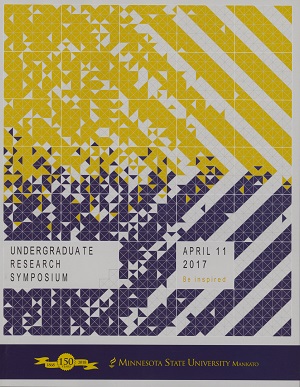Are Escherichia coli (E. coli) Isolated from Minneopa Creek Developing Resistance to 10 Antibiotics?
Location
CSU Ballroom
Start Date
11-4-2017 10:00 AM
End Date
11-4-2017 11:30 AM
Student's Major
Biological Sciences
Student's College
Science, Engineering and Technology
Mentor's Name
Beth Proctor
Mentor's Department
Biological Sciences
Mentor's College
Science, Engineering and Technology
Description
E. coli is a pathogenic indicator for water contamination by manure. Many antibiotics are used as additives in livestock feed and are important human medicines. The purpose of this research was to determine if E. coli collected from multiple sites along Minneopa Creek are sensitive, developing resistance, or resistant to 10 antibiotics (Amoxicillin/Clavulanic Acid, Cefotaxime, Ciprofloxacin, Erythromycin, Gentamicin, Lincomycin, Neomycin, Oxytetracycline, Rifampin, and Tetracycline). All antibiotics are used to treat E. coli, except Lincomycin, which was included as a negative control. Antibiotic resistance was measured on samples collected on November 8 and November 29, 2016 using the Kirby-Bauer disk diffusion assay. On both dates, E. coli colonies tested were sensitive to Gentamicin and Ciprofloxacin. All but one colony tested were sensitive to Cefotaxime, Tetracycline and Oxytetracycline. Eleven out of 13 colonies tested November 8 were sensitive to Rifampin, but 19 out of 22 colonies tested November 29 were resistant and 2 were developing resistance. Four out of 12 colonies tested November 8 were developing resistance to Amoxicillin/Clavulanic Acid and 16 out of 22 colonies tested November 29 were completely resistant and 2 were developing resistance to it. Eight out of 12 colonies tested November 8 were developing resistance to Neomycin and 7 out of 22 colonies tested November 29 were developing resistance to it. Out of 12 colonies on November 8, 6 were developing resistance and two were resistant to Erythromycin and on November 29, 15 out of 20 colonies were developing resistance and 4 were resistant to it.
Are Escherichia coli (E. coli) Isolated from Minneopa Creek Developing Resistance to 10 Antibiotics?
CSU Ballroom
E. coli is a pathogenic indicator for water contamination by manure. Many antibiotics are used as additives in livestock feed and are important human medicines. The purpose of this research was to determine if E. coli collected from multiple sites along Minneopa Creek are sensitive, developing resistance, or resistant to 10 antibiotics (Amoxicillin/Clavulanic Acid, Cefotaxime, Ciprofloxacin, Erythromycin, Gentamicin, Lincomycin, Neomycin, Oxytetracycline, Rifampin, and Tetracycline). All antibiotics are used to treat E. coli, except Lincomycin, which was included as a negative control. Antibiotic resistance was measured on samples collected on November 8 and November 29, 2016 using the Kirby-Bauer disk diffusion assay. On both dates, E. coli colonies tested were sensitive to Gentamicin and Ciprofloxacin. All but one colony tested were sensitive to Cefotaxime, Tetracycline and Oxytetracycline. Eleven out of 13 colonies tested November 8 were sensitive to Rifampin, but 19 out of 22 colonies tested November 29 were resistant and 2 were developing resistance. Four out of 12 colonies tested November 8 were developing resistance to Amoxicillin/Clavulanic Acid and 16 out of 22 colonies tested November 29 were completely resistant and 2 were developing resistance to it. Eight out of 12 colonies tested November 8 were developing resistance to Neomycin and 7 out of 22 colonies tested November 29 were developing resistance to it. Out of 12 colonies on November 8, 6 were developing resistance and two were resistant to Erythromycin and on November 29, 15 out of 20 colonies were developing resistance and 4 were resistant to it.
Recommended Citation
Jones, Melissa and Caitlin Flynn. "Are Escherichia coli (E. coli) Isolated from Minneopa Creek Developing Resistance to 10 Antibiotics?." Undergraduate Research Symposium, Mankato, MN, April 11, 2017.
https://cornerstone.lib.mnsu.edu/urs/2017/poster-session-A/48




